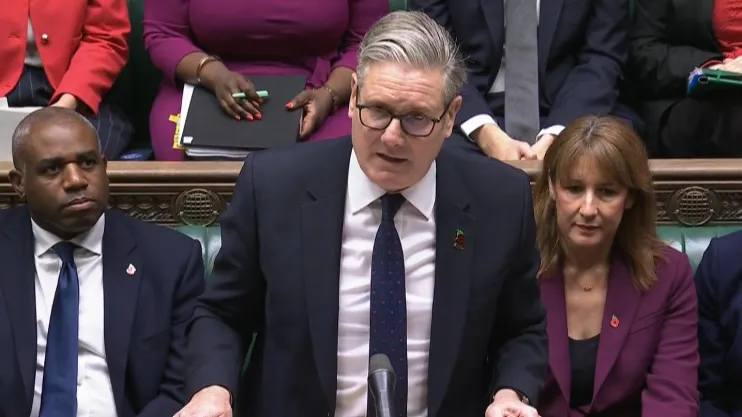UK Prime Minister, Keir Starmer has failed to stand by his manifesto pledge not to raise key taxes at next month’s Budget as he did not repeat the promise not to raise income tax rates, VAT or National Insurance during Prime Minister’s Questions.
It comes amid increasing speculation that Chancellor Rachel Reeves could break Labour’s manifesto pledges, as she seeks to raise billions of pounds to plug a Budget shortfall.
Reeves is widely expected to raise taxes at the Budget on November 26, 2025, after gloomy economic forecasts and a series of U-turns on welfare cuts made it harder for her to meet her own tax and spending rules.
As recently as July, Starmer had insisted that he stood by his manifesto tax promises, simply answering “yes” when asked by Conservative leader Kemi Badenoch at a previous PMQs session in July. By the end of last month, Ministers said “the manifesto stands today.”
However, when asked the same question today, Starmer only replied that the government would lay out its plans at next month’s Budget.
Badenoch challenged Sir Keir during Wednesday’s Prime Minister’s Questions over his refusal to rule out hiking certain taxes on working people, asking “what’s changed in the past four months?”
The Labour leader replied that no Prime Minister or Chancellor would ever set out their plans in advance. He stressed that a productivity review that’s being undertaken confirms that “the Tories did even more damage to the economy than we previously thought.”
“We will turn that around. We’ve already delivered the fastest growth in the G7 in the first half of this year. Five interest rate cuts in a row, trade deals with the US, EU and India. They broke the economy. We’re fixing it.”
“The Budget is on November 26 and we will lay out our plans, but I can tell the House now that we will build a stronger economy, we will cut NHS waiting lists and deliver a better future for our country.”
Keir Starmer
Labour’s 2024 general election manifesto contained a pledge not to raise “the basic, higher, or additional rates of income tax,” or rates of VAT.
The party also promised not to increase National Insurance, prompting a row last autumn when it announced a hike in the contributions paid by employers. The pledges not to raise these taxes has considerably reduced Reeves’ room for manoeuvre ahead of the November 26 Budget.
Reeves announced tax rises worth £40bn a year at her first Budget last November, including hikes to National Insurance paid by employers, and insisted she would not have to repeat the move in subsequent years. However, the Chancellor recently admitted that she is looking to raise taxes again in a bid to put the UK’s finances on a firmer footing.
Some senior Labour figures are privately suggesting to Reeves that now is the time in the Parliament to make the case for putting up income tax. They argue it is still years until the general election and it could raise a lot of money.
However, the idea leaves other Labour figures deeply nervous because it would amount to a spectacular breach of their pre-election promise, which Ministers have repeated many times since. Some also worry it could depress the economy further at a time of weak economic growth.
Starmer Blames Downgrade On Conservatives
The Office for Budget Responsibility (OBR) is set to revise down its predictions for productivity of the UK economy, leading to a £20bn gap in meeting tax and spending rules.
Starmer told MPs that the downgrade showed the “true extent of the damage” done to the economy by the Conservatives, citing “austerity,” Brexit and the mini-Budget under Liz Truss in September 2022.
Badenoch rejected this, and hit back that Starmer was more prepared to “dip into people’s pockets” than upset Labour MPs by cutting welfare spending.
“He is raising taxes because he is too weak to control spending. He’s blaming us. He’s blaming the OBR (Office for Budget Responsibility).
“Last week, they were blaming Brexit. Isn’t the truth that with this prime minister, it’s always someone else’s fault?”
Kemi Badenoch
The pound fell sharply today, following reports that the OBR had cut its productivity forecast, due to be unveiled in the Budget.
READ ALSO: Adu-Boahene’s ₵49 Million Trial: Supreme Court Dismisses Bid to Remove Trial Judge























